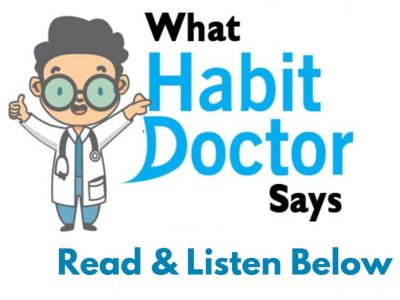Habits pull the puppet of our everyday lives like invisible strings. The majority of what you do, including waking up, drinking coffee, checking your phone, and brushing your teeth, is done subconsciously. However, it feels like moving mountains when you attempt to break even a small habit. Why? Because it takes more than just “trying harder” to break a habit. It’s an intriguing process that involves emotional layers, brain circuits, and—surprisingly—a change in self-perception.
The Habit Loop: The Brain’s Autopilot
The deep structure known as the basal ganglia, which regulates routine behaviors, was discovered by brain researchers in the mid-1990s. Imagine it as your mental autopilot system. Neurons fire in a pattern each time you perform an action, such as brewing tea at six in the morning. If you repeat that pattern enough, it turns into a powerful neural track that resembles a railroad line. Habits feel automatic because of this. The catch is that the old track remains even after you stop the behavior. When triggered, it will awaken from its dormant state. Because of this, a single cigarette can reintegrate a former smoker.
Rewiring the Brain through Neuroplasticity
Fortunately, our brains are not composed of concrete. They can create new pathways because they are neuroplastic. You’re forging a new path through your mental jungle when you adopt a new habit. It’s messy at first. You forget, trip, and stumble. However, if you do it again, the new path will soon become more obvious and simpler to follow. Dopamine, the neurotransmitter of reward and anticipation, is essential along the way. It’s interesting to note that change is driven by expectations rather than the reward itself. That’s why it’s so effective to celebrate little victories while forming a habit. Your brain strengthens the new connection even if you do a “good job” mentally.
The Habitual Emotional Tapestry
Emotions play a role in habit change as well as neurons. Feelings like comfort, stress relief, and nostalgia are linked to a lot of habits. For example, quitting smoking entails letting go of the memories associated with smoking, such as relaxing during a stressful day or taking coffee breaks with friends, in addition to the nicotine. These emotional connections are stored in the brain and are difficult to release. For this reason, when changing a habit, emotional discomfort frequently manifests. You may experience strange restlessness, emptiness, or irritation. Consider these emotions as indicators that your brain is moving its emotional furniture around, not something to be afraid of.
An Individual Battle (and Victory)
I used to struggle with late-night doom-scrolling. I would tell myself, “Just five minutes,” but two hours later I was looking at my phone with my eyes hurting and my brain racing. My mood was sour, and the mornings were groggy. I ultimately made the decision to read ten pages of a book before bed in order to break the habit. My phone felt like it had a magnetic pull, which made the first week difficult. But gradually, the desire changed. I reached for the book one night rather than the phone without even thinking about it. I realized then that my brain had begun to work in my favor. The rewiring of the neurons was effective.
Identity: The Secret Driver of Transformation
People frequently overlook the fact that identity is closely linked to habits. According to neuroscience, habits stick when they are consistent with your self-perception. “I’m trying to quit smoking” is not as strong as “I’m not a smoker.” Your behavior starts to change after that tiny linguistic change tells your brain that you’re changing. To put it another way, altering a habit also alters your narrative about yourself.
Useful Advice for Breaking Habits (That Actually Works)
- Begin modestly. Large-scale overhauls are rarely successful. Pick one small habit, such as drinking more water, doing two push-ups, or losing one tooth. Tiny wins snowball.
- Integrate New Habits with Current Practices. Your brain adores cues. After brushing your teeth, meditate, and as soon as you wake up, stretch. New habits stick because of this cascading effect.
- Make ingrained behaviors more difficult. Don’t keep snacks close at hand if you want to quit snacking. Put them out of sight and out of mind by hiding them, unplugging the TV, and removing the app.
- Give yourself a reward. The power of positive reinforcement is immense. Honor any advancement, no matter how tiny. Your brain will begin to yearn for that feeling of accomplishment.
- Be prepared for and welcome slips. Relapses are not an indication of failure; rather, they are a necessary part of the process. Avoid letting a bad day turn into a bad week. Restart and continue.
The Old Habits Never Go Away
The sobering reality is that old habits don’t completely go away. Like overgrown roads obscured by weeds, those ancient neural tracks still exist. Stress or nostalgia may cause you to regress. But that’s biology, not failure. The good news is that the old habit is mostly buried as the new one becomes the main road with practice.
The Poetic Aspect of Breaking Habits
It’s not about being flawless when trying to break a habit. It all comes down to perseverance, patience, and a healthy dose of self-compassion. Your brain is both a poet and a scientist; it remembers with emotion and rewires with icy precision. When you develop a new habit, you’re teaching your brain a new tune in addition to changing your behavior. It sounds awkward and out of tune at first. But eventually, you won’t even be aware that you’re humming it.
What tiny habit are you willing to start—or break—today? Although it might not be simple, changing habits is worthwhile. And by doing so, you’ll change not just your brain but also your life.


